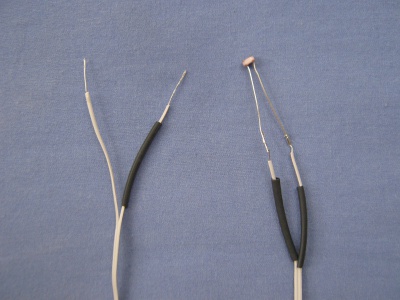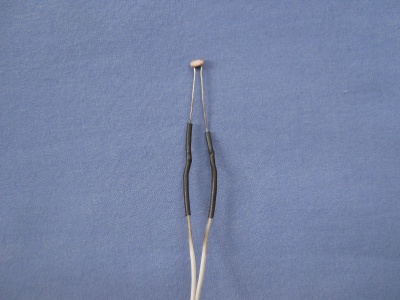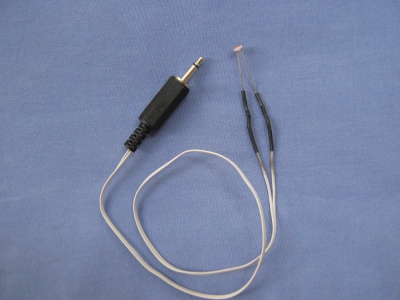Making XO sensors/Making a Light Sensor: Difference between revisions
Jump to navigation
Jump to search
No edit summary |
DanielDrake (talk | contribs) No edit summary |
||
| (16 intermediate revisions by 6 users not shown) | |||
| Line 1: | Line 1: | ||
* [[Making XO sensors/Lichtsensor|Lichtsensor bauen (German)]] |
|||
<div style="font-size: 1.0em;" align=center> |
|||
* [[Making XO sensors/Construir_Sensor_Luz|Construir un sensor de luz (Spanish) - to be done!]] |
|||
'''MAKING A LIGHT SENSOR'''</div> |
|||
You need: |
|||
* a photoresistor, (light dependent resistor),[http://www.parallax.com/Store/Sensors/ColorLight/tabid/175/CategoryID/50/List/0/SortField/0/Level/a/ProductID/175/Default.aspx] [http://www.jaycar.com.au/productView.asp?ID=RD3480] [https://www.radioshack.com/product/index.jsp?productId=2062590] |
|||
* heat-shrink tubing, 2mm diameter, the length of the photoresistor leads plus about 1cm, |
|||
{| class="wikitable" |
{| class="wikitable" |
||
|- |
|- |
||
| [[Image: |
| [[Image:Light sensor 01.jpg|400px]] |
||
| As shown in the picture, tear the two ends of the wire apart (as you did when making a plug) and use a Stripper to strip the wire bare. |
| As shown in the picture, tear the two ends of the wire apart (as you did when making a plug) and use a Stripper to strip the wire bare. |
||
Slide on the X (heat-compressible rubber tubing) onto both ends of the wire as shown. Only one side is shown in the picture, but follow the same process for the other wire. |
Slide on the X (heat-compressible rubber tubing) onto both ends of the wire as shown. Only one side is shown in the picture, but follow the same process for the other wire. |
||
Next, use the soldering iron to connect the two ends of the wire to the two ends of the sensor. This can be done by adding some solder to the two end contact points of the sensor and to the bare ends of the wire. Subsequently, join the two together as shown in the picture, and allow the solder to cool, solidify and thus connect. |
Next, use the soldering iron to connect the two ends of the wire to the two ends of the sensor. This can be done by adding some solder to the two end contact points of the sensor and to the bare ends of the wire. Subsequently, join the two together as shown in the picture, and allow the solder to cool, solidify and thus connect. |
||
|- |
|- |
||
| [[Image: |
| [[Image:Light sensor 02.jpg|400px]] |
||
| Next, slide the rubber tubing up the wire so that it completely covers the two contact points, and then use X (hot air) to compress the rubber tubing onto the wire. |
| Next, slide the rubber tubing up the wire so that it completely covers the two contact points, and then use X (hot air) to compress the rubber tubing onto the wire. |
||
|- |
|- |
||
| [[Image: |
| [[Image:Light sensor 03.jpg|400px]] |
||
| '''A finished light sensor!''' |
| '''A finished light sensor!''' |
||
|} |
|} |
||
== Other sensor instructions == |
|||
{{Special:PrefixIndex/Making_XO_sensors/}} |
|||
[[Category:XO sensors]] |
|||
Latest revision as of 02:45, 23 October 2012
You need:
- a photoresistor, (light dependent resistor),[1] [2] [3]
- heat-shrink tubing, 2mm diameter, the length of the photoresistor leads plus about 1cm,
Other sensor instructions
- Making XO sensors/Construir Sensor Luz
- Making XO sensors/How to connect sensors
- Making XO sensors/Lichtsensor
- Making XO sensors/Making a Humidity Sensor
- Making XO sensors/Making a Light Sensor
- Making XO sensors/Making a Magnetic Sensor
- Making XO sensors/Making a Switch Sensor
- Making XO sensors/Making a Temperature Sensor
- Making XO sensors/Making a Thermistor


